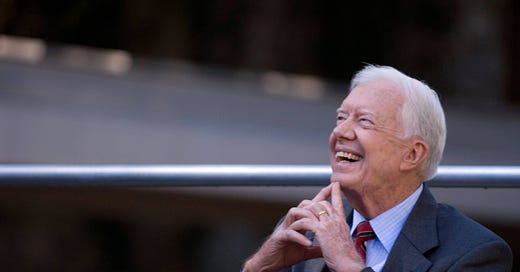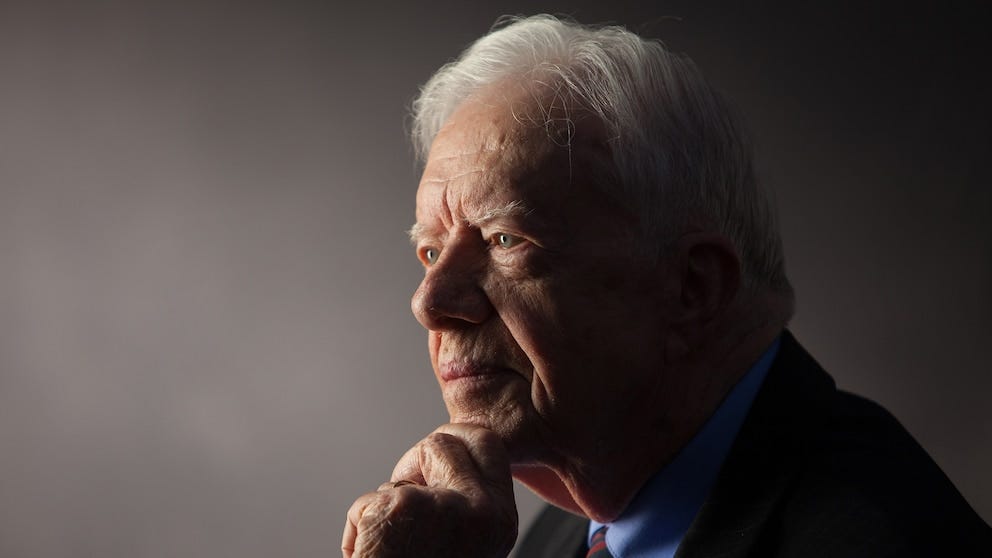I’ve written a lot about Jimmy Carter over the last few years, including Sunday’s piece about my experience as his biographer. In 2021, I wrote about attending the Carters’ 75th wedding anniversary in Plains; in 2023, when he went into hospice, I wrote a detailed piece about his life and career; and this October, when he turned 100, I told some war (peace?) stories about my experience with him, on a Habitat work site and elsewhere. Now I’d like to highlight his vision:
I found it fitting that I was at an auto dealership shopping for an EV (not a Tesla!) when I first received word from one of Carter’s sons that this time, he was truly at death’s door. If Carter had been reelected president, he planned to begin moving the country toward electric vehicles in the early 1980s. Even if slow battery development had hindered progress, that would still have put Carter about 30 years ahead of any other global leader.
I mention that at this sad time because when considering the lazy shorthand take on Jimmy Carter —mediocre president, inspiring former president — we need to understand that only the second half of that cliche is true. In office, as I’ve often argued Carter was a political failure (shellacked by Ronald Reagan in 1980) but a substantive and often visionary success.
I’m hoping that the reappraisal of his presidency that is already underway will do more than strengthen his particular place in history. With any luck, it should also help us judge all presidents in more sophisticated ways.
Journalists judge elected leaders by how they perform politically. Historians need to do that, too, but also assess how well they are preparing the United States for the future. By that standard — and one of basic human decency — Carter was an outstanding American president.
Of course, Carter will not go on Mount Rushmore. As president, he was plagued by a run of bad luck (ruinous inflation and interest rates, gas lines, the seizure of hostages in Iran), and he lacked an intangible quality of leadership that makes people want to charge up a hill behind.
Rosalynn Carter, his wife of 77 years and closest adviser, thought he was a leader of a different kind. “A leader can lead people where they want to go,” she told me in 2015. “A great leader leads people where they ought to go.” Her husband lived the advice of the columnist Walter Lippmann to “plant trees we will never get to sit under.”
Energy and the environment are instructive examples, and not just because he forged the nation’s first green energy policy, doubled the size of the national park system, pushed through the first real fuel economy standards and approved the first toxic waste cleanup. His placement of solar panels on the roof of the White House (later removed by Reagan) was symbolic but backed up by major bills that promoted solar for the first time. And he was ambitious for more. At the Carter Library in Atlanta, I found articles about global warming in scientific journals of the early 1970s that he had underlined. By the end of his presidency, he became the first leader anywhere in the world to advocate slowing carbon emissions. The levels of necessary reduced emissions identified by the Carter White House in 1980 were identical to those ratified 35 years later by the Paris Climate Accords — which lends a tragic dimension to that year’s election.
Carter’s vision and determination to prepare the country and the world for the future extended to the Camp David Accords, his pathbreaking human rights policy, his ability to convince the Senate to ratify the Panama Canal Treaties, his normalization of relations with China, and of course his reinvention of the post-presidency, which created a model for his successors.
By the end of his life, the criticism of Carter’s shortcomings had given way to appreciation of his core decency. This week I’m thinking that beyond his heavenly reward lies his earthly example: A life of ceaseless effort, not only for himself but for the world he helped shape.







A good and great man in his own way.; ahead of his time.
An outstanding leader in his second career.
A man to be honoured now and remembered always.
Thank you very kind author I am saving all essays about our most beloved jimmy in preparation for an article on presidential topics to consider. Blessings